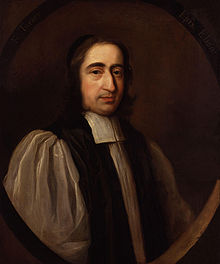Francis Turner (bishop)
| Francis Turner | |
|---|---|
| Bishop of Ely | |
 |
|
| Diocese | Diocese of Ely |
| Term ended | 1690 |
| Orders | |
| Ordination | 1683 |
| Personal details | |
| Born | 23 August 1637 |
| Died | 2 November 1700 London, England |
| Denomination | Church of England |
| Alma mater | New College, Oxford |
Francis Turner D.D. (23 August, 1637 – 2 November, 1700) was Bishop of Ely, one of the seven bishops who petitioned against the Declaration of Indulgence and one of the nine bishops who refused to take the oath of allegiance to William III.
Turner was the eldest son of Thomas Turner, the Dean of Canterbury, by Margaret (d. 25 July 1692, aged 84), daughter of Sir Francis Windebank. He was born on 23 August 1637, probably in Southwark or Reading. Thomas Turner (1645–1714), the President of Corpus Christi College, Oxford, was his younger brother. Francis married (1676) Anna Horton, who pre-deceased him.
From Winchester College, where he was elected scholar in 1651, Francis proceeded to New College, Oxford, where he was admitted probationer fellow on 7 November 1655, and graduated B. A. on 14 April 1659 and M. A. on 14 January 1663.
Turner’s preferments were mainly due to the favour of the Duke of York, to whom he was chaplain. On 30 December 1664 he was instituted to the rectory of Therfield, in Hertfordshire, succeeding John Barwick. On 17 February 1664-5 he was incorporated at Cambridge, and on 8 May 1666 he was admitted fellow commoner in St. John's College, Cambridge, to which the patronage of Peter Gunning, the Regius Professor of Divinity, attracted him. He compounded BD and D.D. at Oxford on 6 July 1669. On 7 December 1669 he was collated to the prebend of Sneating in St. Paul's Cathedral. On 11 April 1670 he succeeded Gunning as Master of St. John's, Cambridge; he was vice-chancellor in 1678, and resigned his mastership, "because of a faction," at Christmas 1679. In 1683 he became rector of Great Haseley, Oxfordshire, and on 20 July of that year he was installed Dean of Windsor. He was consecrated Bishop of Rochester, at Lambeth on 11 November 1683, holding his deanery in commendam, with the office of Lord High Almoner. On 16 July 1684 he was translated to Ely (confirmed 23 August) in succession to Gunning, who had made him one of his literary executors. He preached the sermon at James II's coronation (23 April 1685); in the following July he prepared Monmouth for his execution.
...
Wikipedia
